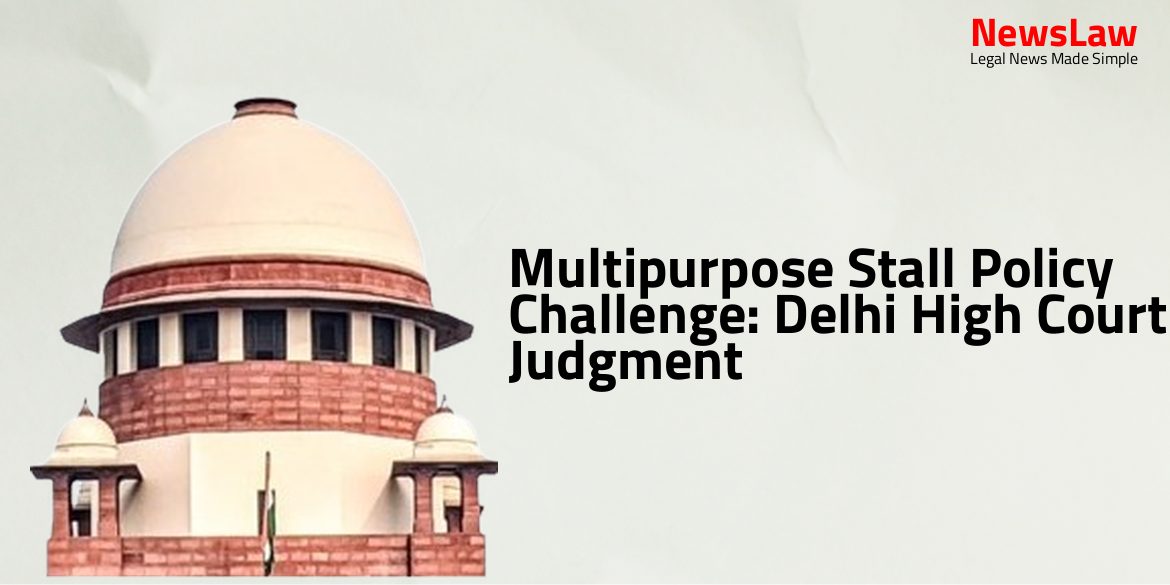Delhi High Court recently delivered a significant judgment on the challenge against the Multipurpose Stall Policy. The case involved the petitioners who sought renewal and extension of their licenses under the policy. The respondents, Railway Board, were at the center of the legal dispute. Let’s delve into the details of this crucial court decision.
Facts
- The tenure of licenses for the petitioners was initially until 21.12.2022, extended to 27.02.2023 due to Covid-19 lockdown as a force majeure event.
- The Master License Agreements and extension letters dated 14.12.2022 have been challenged in the petition.
- The agreements explicitly state no extension or renewal provision.
- P1 and Railway Board executed Master License Agreement on 29.10.2021.
- Petitioners are directed to vacate their MPS by 27.02.2023.
- P1 operates three MPS at Bareilly Railway Station.
- P2 operates one MPS at Moradabad Railway Station.
- P3 operates one MPS at Haridwar Railway Station.
- The conversion of stalls/trolleys to MPS was enforced by the Railway under the 2017 Policy.
- P1 and Railway executed Master License Agreement on 31.03.2021.
Arguments
- The petitioners argue that the 2017 Policy’s extension to existing stalls/trolleys is arbitrary.
- They claim that the 68-day extension due to Covid-19 is arbitrary as other MPS units received longer dies non periods.
- Petitioners argue for an extension of the license period proportional to the reduction in fees due to decreased foot traffic after the lockdown.
- They seek a writ of mandamus to compel the relevant zonal railways to renew and extend their licenses.
- Petitioners claim that Clause 5 of the 2017 Policy violates Article 14, Article 19(1)(g), and Article 21 of the Constitution by taking away the right of renewal of license.
- Argument is made that the petitioners’ licenses have expired, and they cannot compel the respondents to extend them.
- Petitioners seek renewal based on a legitimate expectation and reference Supreme Court judgments to support their claims.
- The petitioners approach the court claiming that the respondents are renewing licenses selectively and argue for renewal of their licenses as well.
- The petitioners state coercion and unequal bargaining power in converting their stalls to MPS units and challenge the conditions of the new policy.
- Petitioners emphasize their right to livelihood and equal opportunity, citing relevant case law.
- The petitioners’ claim of forced signing of the new policy is dismissed, citing the need for balance between livelihood rights and equal opportunity.
- Petitioners maintain they were not prompted to participate in tender processes or renewal applications previously.
- Petitioners argue against the 2017 Policy preventing monopolisation and stress on the policy providing equal opportunities during re-tendering.
- The petitioner signed a contract for a period of five years which was non-renewable.
- The petitioner cannot now claim ignorance as the terms were clearly specified in the letter of award.
- The petitioner enjoyed the benefits of the contract for five years and cannot go back on the terms now.
- The Supreme Court judgment relied upon by the petitioner was related to Catering Policy, not the Multipurpose Stall Policy in question.
- The petitioner cannot seek to be brought under previous policies after completing the contract.
- The contract in question is not under Catering Policy, but a different policy altogether.
Analysis
- The 2017 Policy includes a provision of 33% sub quota for women in allotment of each reserved category of MPS at all stations.
- Clause 9 of the 2017 Policy specifies reservation in allotment for marginalized sections of society.
- The appellants do not have an absolute right of renewal under the Easements Act or the 2017 Policy.
- The petitioners voluntarily converted their stalls/trolleys to MPS as per the letters presented.
- There is no jurisdictional impediment for the Court to entertain the petitions challenging Clause 5 and Clause 11 of the 2017 Policy.
- The 2017 Policy safeguards the rights of marginalized minorities and weaker sections of society as per constitutional principles.
- The policy does not violate Article 14 of the Constitution.
- The doctrine of legitimate expectation cannot be claimed as a right unless denial leads to a constitutional violation.
- Petitioners being licensees under the 2017 Policy are subject to its terms and conditions.
- Clause 5 of the 2017 Policy clearly states that there will be no extension or renewal of MPS units.
- Challenges to Clause 5 and 11 of the 2017 Policy are unsustainable.
- Licenses were extended for 68 days due to a force majeure event.
- The specific part of the judgment being summarized is numbered as 55.
- The extract from this part discusses a particular aspect of the judgment related to STA.
- It is a key point in the judgment that requires attention and analysis.
- This part likely provides important insights into the interpretation of STA in the context of the case.
- Understanding this part is crucial for comprehending the legal implications of the judgment.
- The court emphasized that the breach or threat to breach a fundamental, statutory, or enforceable equitable right is essential for issuing a writ of Mandamus.
- The court stated that it cannot delve into the detailed factual situations at each railway station to review the extension granted to individual licensees, as it would essentially amount to an appellate jurisdiction.
- Judicial review of a policy decision is distinct from issuing a mandamus to frame policy in a particular manner.
- It was highlighted that a legitimate expectation does not always guarantee relief, as public interest, policy changes, conduct of the expectant, or other valid reasons by the decision-maker may outweigh the legitimate expectation.
- The court reiterated that public bodies like the respondent Board cannot arbitrarily decline to renew a license, as no public body under the constitutional system is empowered with such arbitrary powers.
- The court noted that past relaxations in policy cannot be used as a basis for claiming mandamus for new policy decisions, especially regarding final attempts or age limitations in civil service examinations.
- It was clarified that a writ of Mandamus cannot be used to compel the enactment of new laws or framing of rules, as it is primarily for enforcing fundamental or statutory rights, or fundamental duties related to these rights.
- Individual license agreements between the petitioner and the railway authorities as well as the 2017 Policy contain an arbitration clause.
- The arbitration clause allows the petitioners to invoke arbitration proceedings in case of grievances related to insufficient extension due to the Covid-19 situation or to claim damages.
- Petitioners who have not formally executed their license agreements can also rely on the arbitration clause from the 2017 Policy.
Decision
- Existing stalls/trolleys have the option to convert into Multipurpose Stalls (MPS) as per the 2017 Policy.
- Existing licensees were given two options: either convert to MPS or continue with existing stalls/trolleys till the expiry of the current agreement.
- Petitioners opted for converting their stalls/trolleys to MPS for a tenure of 5 years.
- After the current agreement expires, new MPS spaces will be identified and allotted by Zonal Railways.
- Petitioners agreed to pay the License Fee for the converted MPS units.
- The tenure of 5 years for MPS starts from the date of conversion.
- Petitioners requested conversion of their stalls/trolleys to MPS and agreed to pay revised fees.
- Court dismissed the petitions but granted a 3-month period for petitioners to vacate the stalls for transition.
Case Title: TIWARI AND SONS Vs. UNION OF INDIA & ORS. (2024:DHC:4452)
Case Number: W.P.(C)-4938/2024



